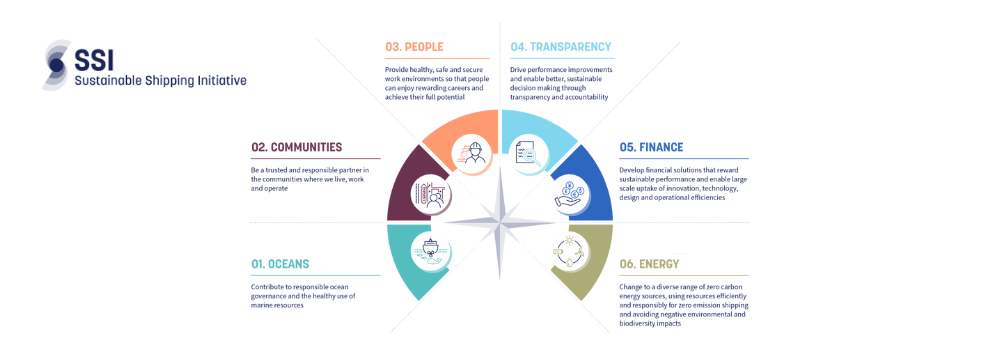Awaken New Depths. This year’s World Ocean Day theme encourages us to reflect on the state of our world’s oceans and dive beneath the surface to explore new depths of understanding, compassion, collaboration and commitment. Covering 70% of the planet, the oceans are instrumental to life on Earth. With over 100,000 ships navigating them, the shipping industry has a pivotal role in securing a thriving ocean ecosystem for future generations and enabling a sustainable global blue economy.
We are currently facing a triple planetary crisis – climate change, pollution, and biodiversity loss – due to human activity over the last few decades. One thing is clear, change must happen. Amongst this growing call for action, it is pertinent that we reflect on the importance of the action of our industry and our oceans, and how the two are interlinked. Oceans produce over 50% of the planet’s oxygen and absorb around 30% of carbon dioxide – they are central to human flourishing and play a key role in mitigating the impacts of climate change. Furthermore, over 3 billion people rely on the ocean for their livelihood, and the oceans are home to marine life and ecosystems, with around 12,000 new species being discovered each year. It is easy to take what we know for granted, but our oceans need our help, and we cannot turn a blind eye.
Sailing the world’s oceans and carrying around 90% of traded goods over waves, shipping has a crucial role to play, with daily operations impacting this crucial habitat. Shipping has the responsibility to not only minimise pollution but also the responsibility to support ocean biodiversity and help gather data to better understand this ecosystem. Halfway through the UN Ocean Decade, shipping can grasp a new opportunity – to become a leading industry when it comes to operating with the ocean and to lead on the creation of a sustainable blue economy.
But the picture wasn’t always this clear. In 2010, the Sustainable Shipping Initiative (SSI) was founded with the mission to gather leading and like-minded industry players and catalyse action towards a sustainable shipping industry. Since then, SSI has worked hard to introduce the industry to emerging sustainability issues and concepts, from biofuels to biodiversity, circularity to just and equitable transition. These aspects do not exist in silos, and SSI’s holistic perspective of targeting sustainability has led to the creation of the Roadmap to a Sustainable Shipping Industry, which showcased the interconnectedness of various goals and united the industry around a common vision.
Created in 2016 and updated in 2020, the Roadmap lays out pathways and defines tangible milestones for shipping to achieve as a collective over the coming decades, targeting issues including the need for rapid decarbonisation by 2050 to labour and human rights risks faced by seafarers worldwide. The Roadmap makes sustainability achievable by breaking concepts down into six different vision areas – each with its own set of objectives, desired outcomes, and interrelated milestones: Oceans, Communities, People, Transparency, Finance, and Energy.
At the start of the year, SSI announced the launch of a new programme, the State of Sustainable Shipping (SoSS). The SoSS programme builds on the Roadmap to a Sustainable Shipping Industry, by providing comprehensive and timely insights into the industry’s progress against the six vision areas. It uses a mix of digital, research, and strategic foresight methods to track and challenge this performance. SoSS will share knowledge, identify transformative pathways, and catalyse action by enabling more effective decision-making by maritime value chain actors, allowing maritime stakeholders to prioritise investments effectively and encourage systemic change on the most pressing issues.
The Roadmap is a living document and in our current focus on the Ocean vision area, we have identified a new theme of biodiversity. Building on this, we are focusing on ways to integrate biodiversity into decarbonisation initiatives for co-benefits and synergies – a win for both climate action and biodiversity.
The International Maritime Organization (IMO) Marine Environment Protection Committee (MEPC) 81 and the United Nations agreement on Biodiversity Beyond National Jurisdiction (BBNJ), otherwise known as the High Seas Treaty, have pointed to a general upward trend of climate action, from decarbonisation to biodiversity. Our oceans are at the forefront of climate change impacts, but they are also part of the solution. On this front, collective action and collaboration are even more pivotal towards progress. Ocean action is climate action, and it will benefit us all.
Shipping has an opportunity to pave the way for other industries, showcasing how the industry can be uplifted to mitigate negative impacts and to support a thriving ocean ecosystem that helps us combat climate change and meet the Paris Climate Agreement. Humanity is heading into unchartered waters, but we have the power to ensure that we are on the right side of history and to steer the ship towards the side of prosperity, sustainability, and resilience.
SSI is a catalyst for change in the maritime industry, working to drive progress in sustainability. If you want to get involved, reach out to [email protected] and fill out this survey.

